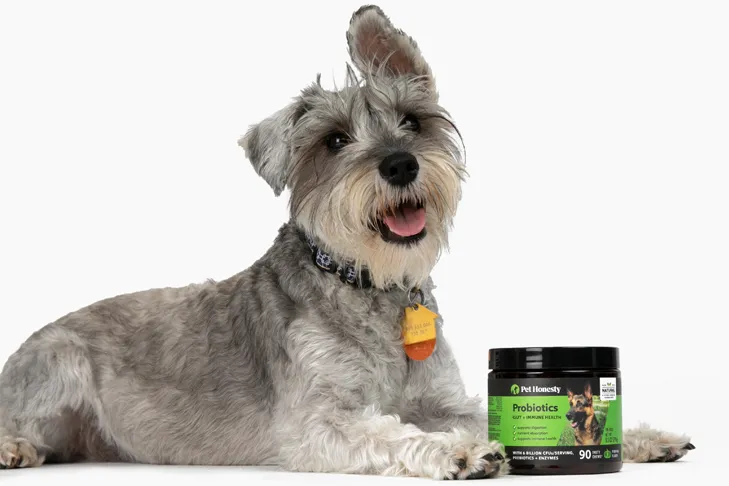An overgrowth of yeast can turn your dog’s skin into an itchy, inflamed, and deeply uncomfortable battleground. While any dog can experience a yeast infection, they are particularly prevalent in dogs with underlying allergies and are often triggered by an imbalanced diet or the extensive use of antibiotics. If your canine companion is showing signs of discomfort, understanding the role of gut health and supportive supplements like Probiotics For Dogs Yeast Infection can be a game-changer. These beneficial microorganisms help restore the delicate balance of “good bacteria” in your dog’s gut, skin, and ears, offering a natural pathway to relief and prevention.
Many veterinarians, after assessing a dog’s diet and possibly prescribing oral or topical treatments, often recommend incorporating probiotics into their regimen. Probiotics are not just a trend; they are living microorganisms that, when administered correctly, can preserve or restore a healthy microbial balance. This guide will delve into what causes yeast infections, how probiotics specifically target them, their broader health benefits, and crucial tips for choosing the right probiotic supplement to support your dog’s journey back to comfort and vitality. A balanced diet, such as a nutritionally balanced dog food, often works hand-in-hand with probiotics for optimal results.
Understanding Canine Yeast Infections: Causes and Symptoms
Yeast, a type of fungus, naturally resides on your dog’s skin, in their ears, and on mucous membranes in small, harmless numbers. However, when various health and lifestyle factors tip the scales, this yeast can proliferate uncontrollably, leading to a full-blown infection.
Common health factors predisposing dogs to yeast overgrowth include a history of allergies (environmental or food-related) and recurring bacterial infections. These conditions can compromise the skin barrier and immune system, creating an ideal environment for yeast to flourish. Lifestyle factors also play a significant role. A poor-quality diet lacking essential nutrients or high in inflammatory ingredients can disrupt gut health, which in turn impacts skin immunity. Additionally, exposure to hot and humid environments, or prolonged courses of antibiotics that indiscriminately kill both good and bad bacteria, can set the stage for yeast to take over. If you’re exploring homemade dog food for hip dysplasia or other health issues, ensure it supports overall gut health.
Yeast infections commonly manifest in areas like the ears, paws, skin folds, and armpits. In the ears, you might observe scabbing, excessive head shaking, a waxy brown or black discharge, and a strong, often sweet or “yeasty” odor. Dogs might rub their ears excessively, tilt their head, or even lose their balance if the infection is severe. On the skin, symptoms can include intense itching, redness, greasy fur, hair loss, flaky skin, and a distinct “sour milk” smell. Paws may appear red and irritated, and dogs might constantly lick or chew them. Early identification of these symptoms is crucial for prompt and effective treatment.
 A Biewer Terrier relaxing in a park, often dogs with allergies, which can lead to yeast infections, benefit from probiotic support.
A Biewer Terrier relaxing in a park, often dogs with allergies, which can lead to yeast infections, benefit from probiotic support.
The Canine Microbiome: Why Probiotics Matter for Yeast Control
Just like humans, dogs host a complex ecosystem of microorganisms known as the microbiome. This diverse collection of bacteria, fungi, and viruses lives on and inside your dog’s body, particularly in the gastrointestinal tract, skin, and ears. This delicate balance is crucial for overall health, with “good bacteria” playing vital roles in digestion, nutrient absorption, and immune function.
However, various factors, including poor diet, stress, environmental toxins, and medication use (especially antibiotics), can disrupt this balance, leading to dysbiosis—an imbalance in the microbiome. This imbalance can pave the way for numerous health issues, including the overgrowth of opportunistic pathogens like yeast.
Probiotics are living microorganisms, primarily beneficial bacteria and yeasts, that are non-pathogenic, meaning they do not cause illness. When ingested in appropriate amounts, these probiotics can significantly benefit dogs and people alike. Dr. Amy Attas, VMD of New York-based City Pets, notes, “These organisms behave very similarly to the good bacteria that are normally residing in an animal’s gastrointestinal tract.” Crucially, effective probiotics must be able to survive the acidic environment of the stomach and successfully colonize the gut to exert their beneficial effects. They support the existing beneficial bacteria and are essential for manufacturing and saving vitamins from food as it passes through the intestinal tract.
How Probiotics Combat Yeast Overgrowth in Dogs
The primary mechanism by which probiotics help with yeast infections is by promoting a balanced microbial environment. By fostering a healthy population of beneficial bacteria in the gut, ears, and on mucous membranes, probiotics create an environment that is highly inhospitable to yeast. As Dr. Attas explains, “When the normal bacteria are present, they create an environment that is very inhospitable to yeast.” This is because beneficial bacteria actively compete with yeast for nutrients and attachment sites, effectively preventing yeast from colonizing and causing an infection.
Certain probiotic strains are particularly effective in this battle. For instance, Lactobacillus acidophilus and Bifidobacteria are well-known for their ability to absorb nutrients and ward off harmful microorganisms. Lactobacillus acidophilus, in particular, produces lactic acid, which lowers the pH level in the gut. This more acidic environment makes it extremely difficult for yeast to survive and reproduce.
Probiotics are also indispensable when dogs have been on antibiotics. Antibiotics, while necessary for bacterial infections, often destroy beneficial bacteria along with harmful ones, inadvertently creating a vacuum that yeast can easily fill. Administering probiotics during and after antibiotic therapy helps replenish the beneficial bacteria, mitigating the risk of secondary yeast infections and accelerating the restoration of normal gut flora. Even exploring options for a best diet for dogs with kidney disease or other conditions can be part of a holistic approach alongside probiotics.
Interestingly, in specific contexts and doses, even bacteria typically associated with disease, such as certain strains of Escherichia coli (E. coli), can function as probiotics. Similarly, certain types of yeast, like Saccharomyces boulardii, are used as probiotics to address gastrointestinal symptoms such as diarrhea. This highlights the complex and nuanced relationship between microorganisms and canine health.
 Pet Honesty probiotic supplements for dogs, designed to combat yeast infections and support gut health.
Pet Honesty probiotic supplements for dogs, designed to combat yeast infections and support gut health.
Broader Health Benefits of Probiotics for Dogs
Beyond their targeted action against yeast infections, probiotics offer a wide array of health benefits that contribute significantly to a dog’s overall well-being. These advantages stem from a healthy and balanced microbiome, which is foundational to good health.
Firstly, probiotics enhance the absorption of nutrients from your dog’s food. A healthy gut lining and efficient digestion ensure that your dog extracts maximum nutritional value from their diet, supporting all bodily functions. They can also play a role in decreasing allergy symptoms, as a significant portion of the immune system resides in the gut. By modulating immune responses, probiotics can help reduce hypersensitivity reactions that contribute to skin issues and inflammation often associated with yeast infections.
Maintaining robust digestive health is another core benefit, alleviating common issues like diarrhea, constipation, and gas. Probiotics achieve this by stabilizing gut flora and supporting proper digestive function. They are also crucial in inhibiting the growth of harmful bacteria and pathogens, acting as a natural defense mechanism within the gut. Furthermore, by bolstering the immune system, probiotics help dogs fight off various infections more effectively. This immune support extends to providing relief for dogs suffering from inflammatory bowel disease (IBD) or colitis, conditions often linked to gut dysbiosis. Overall, integrating probiotics can significantly improve a dog’s general health, leading to increased vitality and a better quality of life. For dogs with specific needs, combining probiotics with specialized diets or supplements, such as exploring spirulina for dogs with kidney disease, can offer comprehensive support. It is generally safe to introduce probiotics to weaned puppies, though it’s important not to interfere with the beneficial bacteria they receive from their mother’s milk.
Choosing and Using the Best Probiotics for Your Dog’s Yeast Infection
While probiotics are readily available without a prescription, always consult your veterinarian before introducing any new supplement to your dog’s regimen, especially when dealing with specific conditions like yeast infections. Their guidance can help you select the most appropriate product for your dog’s unique needs.
Opt for Dog-Specific Products
It’s crucial to select probiotics formulated specifically for dogs. Dr. Attas emphasizes that “The bacteria that live in our bodies have co-evolved with us over millennia,” meaning that the beneficial bacteria in a human’s intestines are distinctly different from those found in a dog’s. Human probiotics may not contain the strains most effective for a canine digestive system, and some may even contain ingredients, like artificial sweeteners, that are toxic to dogs. Canine probiotics come in various forms, including powders, chewable tablets, and liquids, allowing you to choose what best suits your dog’s preference, whether sprinkled on food or hidden in a treat.
Prioritize Reputable Manufacturers
The probiotic supplement industry is not as strictly regulated as the pharmaceutical industry in many countries, including the U.S. This means product quality can vary significantly. Therefore, it’s imperative to purchase products from reputable companies with transparent manufacturing processes and third-party testing to verify the contents. Look for products that clearly list the specific probiotic strains, their quantities (measured in CFUs – Colony Forming Units), and any other active ingredients. A multi-strain probiotic, containing several types of beneficial bacteria, is often recommended for a broader spectrum of support. While some dog foods claim to include probiotics, Dr. Attas cautions that these often contain insufficient amounts of purified probiotics to be genuinely effective. It’s generally better to provide a high-quality probiotic supplement alongside a nutritionally complete and balanced dog food.
Proper Storage and Dosage
Probiotics contain live organisms, and their efficacy depends on their viability. Always read the product label carefully for specific storage instructions; some require refrigeration, while others are shelf-stable. Pay close attention to expiration dates, as “it doesn’t do any good to be giving dead organisms,” as Dr. Attas wisely notes.
Dosage is another critical factor. The label will specify the recommended dose based on your dog’s weight and the concentration of CFUs in each serving. Adhering to these guidelines is essential; introducing too many bacteria too quickly can sometimes cause mild digestive upset. When starting a new probiotic, introduce it slowly. Avoid starting a probiotic on the same day you’re introducing new food or other supplements, as this makes it difficult to pinpoint the cause if your dog experiences an adverse reaction. Some dogs may have a sensitivity or allergy to a particular probiotic strain, so a gradual introduction allows you to observe their response.
Conclusion
Yeast infections can be a persistent and uncomfortable challenge for dogs, but understanding their root causes and exploring supportive measures like probiotics can offer significant relief and contribute to long-term well-being. By restoring the delicate balance of the canine microbiome, probiotics directly combat yeast overgrowth and simultaneously enhance overall digestive health, immune function, and nutrient absorption. While research into the full scope of probiotics in animal health is continually evolving, the anecdotal evidence and growing scientific understanding point to their profound positive effects on dogs’ eating habits, bowel regularity, skin health, and reduced incidence of issues like ear infections. Always consult your veterinarian to ensure probiotics are a suitable addition to your dog’s health plan, particularly when addressing a specific condition like a yeast infection. With expert guidance and the right product, you can harness the power of probiotics to help your dog thrive.
References
- American Kennel Club (AKC). (n.d.). Expert Advice articles on dog health, nutrition, and allergies.
- Attas, A., VMD. (City Pets, New York). Personal communication and expert insights cited within the original article.
- Merck Veterinary Manual. (n.d.). Fungal Infections in Dogs.
- National Center for Biotechnology Information (NCBI). (n.d.). Research articles on Bifidobacteria and Saccharomyces.
